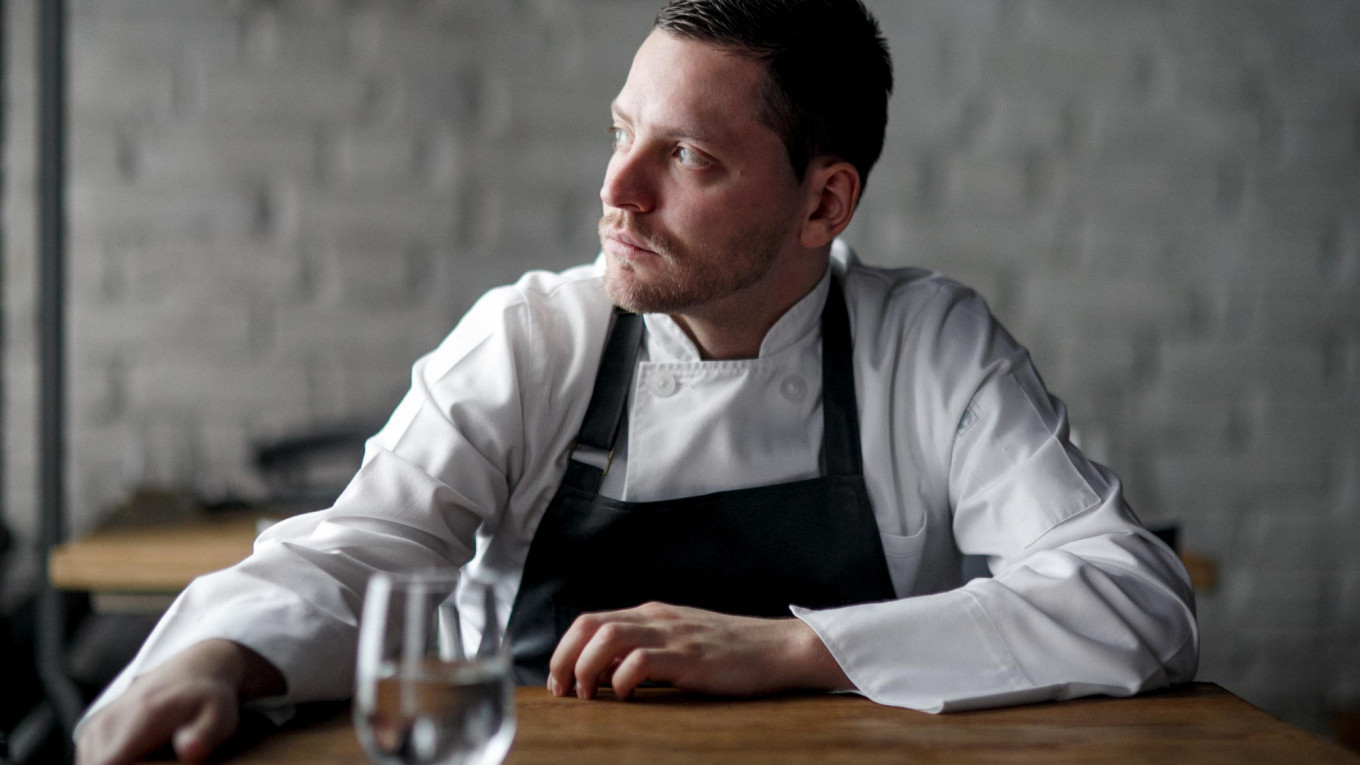Stanislav Pesotsky says his decision to become a chef was “spontaneous.” Born in Kremenchug in central Ukraine, the 2016 Silver Triangle award winner learned the basics in Kiev, where he studied hospitality, business and linguistics. But his first real gastronomic practice came while working in a cafe bar at the Mohegan Sun casino complex in Connecticut, halfway between New York City and Boston. Before the season was done, Pesotsky had been promoted to become chef at California Pizza Kitchen, one of the restaurants at the casino.
“I’ve always been a creative person, had a knack for studying languages and have even been writing music. So I guess cooking became a form of creative expression for me,” he told The Moscow Times. “I came with zero knowledge and skills, but in a few months I got a promotion. The workload was really hard. I had to become a superhero. And fast."
After returning to Ukraine, Pesotsky tried to work as a chef in Kiev, but quickly realized that the work style there was very different from what he was used to in the U.S.
After countless interviews and weeks of waiting, the aspiring chef landed a job at the prestigious Hyatt Regency hotel in the Ukrainian capital. But he only lasted three days.
“It was the same as everywhere else — chaos and disorganization,” says Pesotsky. “The Head Chef was more interested in computer games than cooking. I decided that I didn’t want to work in Ukraine anymore. It was the last straw.”
Outside of the kitchen, Pesotsky was making big decisions. He stopped eating meat and drinking alcohol. His band Pyl (Dust) had finished their second album, and Pesotsky began reading religously. Then he met his future wife, who was living in Moscow.
Six years ago, Pesotsky decided to move to Russia to be with her.
The move to Russia kick-started his culinary career. He worked at the Oblaka restaurant for three years, becoming a sous chef, then worked as a chef at Extra Virgin wine bar.
At the end of 2015 he became Bjorn’s new chef.
Pesotsky put together a completely new team and introduced some radical changes. The new chef applied the principles of the “new Nordic cuisine” to his own ideas and started using only Russian products. Another change was the pricing, which was reduced significantly.

Then came the Silver Triangle. First organized in 2011 by Igor Gubernsky, one of the most influential people in Russia’s restaurant business, the annual contest judges the most talented and innovative chefs in the country. One of the main conditions of the contest is that the food has to represent contemporary Russian cuisine.
Apart from Pesotsky, two other finalists took part in the last round of the 2016 competition: Yevgeny Vikentyev, chef of Hamlet and Jacks restaurant in St. Petersburg, and Oleg Kusov, from Moscow’s Delicatessen. The best chef was determined during a blind taste test. Each chef had to prepare one starter and one main dish. The judges of the contest included prominent Moscow chefs Vladimir Mukhin (White Rabbit); Luigi Mani (Uilliam’s and Pinch); Dmitry Zotov (Madame Wong, Haggis); and Georgy Troyan (Severyane).
The winning dishes were a gravlax sphere with cranberry and horseradish and a shot of vodka as a starter and beef rib with onion and pickled apple.
“My mission is to make Russian cuisine up-to-date, trendy and in-demand all over the world,” Pesotsky said in his acceptance speech.
The two winning dishes are now available at Bjorn, although they have been recreated with some signficant differences. The gravlax sphere was transformed into a dessert called “Snowball”: sea buckthorn and elderberry mousse in a sphere of white chocolate with crumbs of rice biscuits.
The beef, meanwhile, is replaced by pork belly, fried and glazed with onion caramel. “A principle of new Nordic cuisine is not to waste anything and use every product to its full potential,” says Pesotsky. And so along with the onion caramel glazing, the dish offers baked onion with balsamic vinegar, onion purée and crunchy onion pieces, arranged neatly around the pork belly.
A Message from The Moscow Times:
Dear readers,
We are facing unprecedented challenges. Russia's Prosecutor General's Office has designated The Moscow Times as an "undesirable" organization, criminalizing our work and putting our staff at risk of prosecution. This follows our earlier unjust labeling as a "foreign agent."
These actions are direct attempts to silence independent journalism in Russia. The authorities claim our work "discredits the decisions of the Russian leadership." We see things differently: we strive to provide accurate, unbiased reporting on Russia.
We, the journalists of The Moscow Times, refuse to be silenced. But to continue our work, we need your help.
Your support, no matter how small, makes a world of difference. If you can, please support us monthly starting from just $2. It's quick to set up, and every contribution makes a significant impact.
By supporting The Moscow Times, you're defending open, independent journalism in the face of repression. Thank you for standing with us.
Remind me later.






